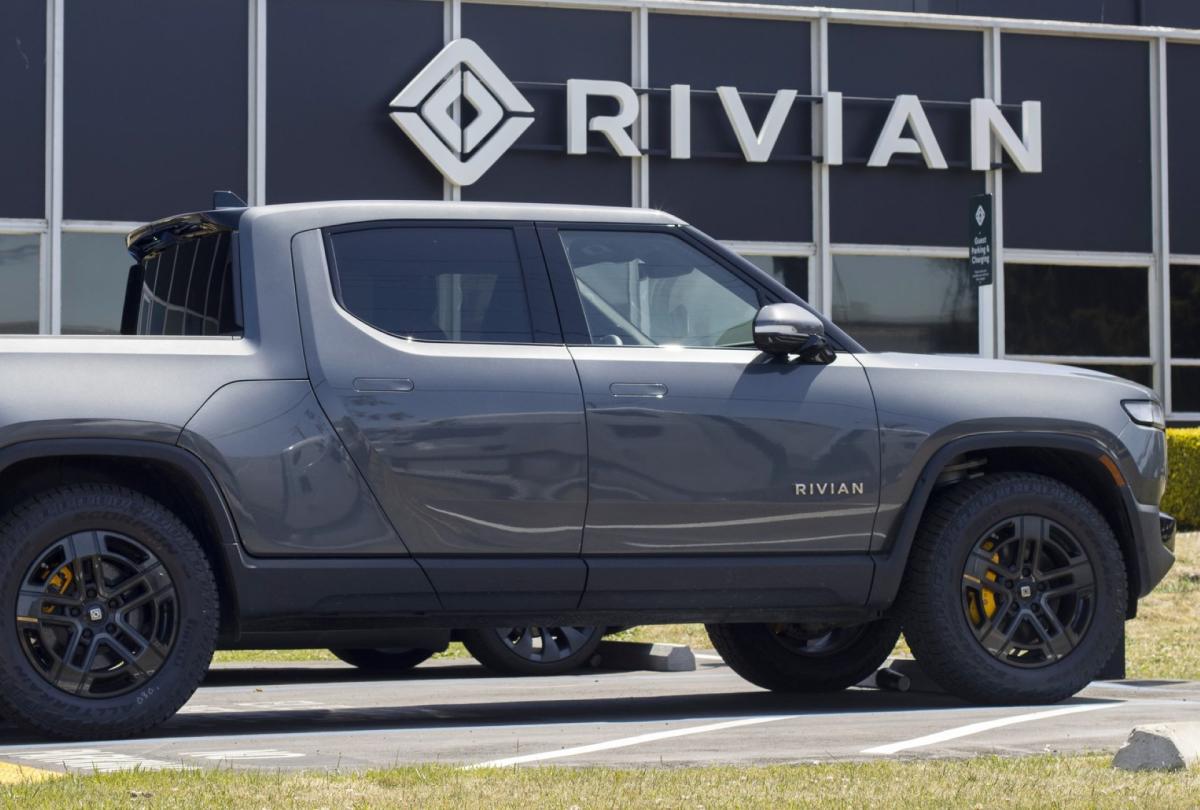Rivian CEO issues strong statement about people who purchase gas-powered cars: ‘Sort of like building a horse barn in 1910’::“I don’t think I would have believed it.”
Forgive me, sire; I hadn’t $80,000 to spend on a luxury truck.
You fuck.
If you knew that he was referring to the purchase of a $80k Suburban in 2030 would that change your assessment?
I think you know very well I would never engage with this possibility as a means of self preservation. Good day sir!
So a $77-82k Suburban is good in your eyes then? How come? Why? Oh wait, you didn’t read the quote.
Just because he compared it to a suburban doesn’t mean that the Mitsubishi mirage and used Corollas aren’t a thing.
And sure the Chevy Bolt is 26k, but that’s still 5k more expensive than a new Corolla and has like half the range, and you can fuel the Corolla way faster.
A luxury truck with the ugliest headlights on a car today.
I love the front end of the Rivian.
I’m not even sure what my headlights look like. I never really see them.
It’s important to read the full quote from Rivian’s CEO before complaining about $75k electric trucks:
“I think the reality of buying a combustion-powered vehicle … is sort of like building a horse barn in 1910,” he said. “Imagine buying a Chevy Suburban in 2030 … what are you going to do with that … in 10 years?”
He’s comparing buying a Rivian truck with buying a Suburban, which has a base price of $57k for the lowest tier configuration (LS) and a $76k price on the High Country configuration.
Proof that very few read the article
What he actually meant to say was:
“I’ve got my head so far up my ass that I think everybody should be spending $100k+ on a truck regardless of their need or financial circumstances. I’m also incapable of doing my job, which is why my company can’t produce enough units, even though it’s largely a solved supply chain problem. This is how I cope with my shitty existence on this planet.”
Um…does the CEO know that horses are still a thing and that horse barns (aka stables) are still in use? Also, the invention of the automobile didn’t instantly displace the horse. It was well into the 1920s before they became a regular sight.
Also…there’s lots of reasons to buy gas-powered cars these days. For one, not everyone lives in a home where they can install the necessary charger, so you’d always be on the “hunt” for charging stations, and fuel cars are generally cheaper at this time. Once we see the market flooded with EV cars, the prices will come down and fuel cars will no longer be the norm, but we’re likely a decade or more away from that.
I get what the CEO is trying to say, but it’s still incredibly tone-deaf.
CEO of an electric car company recommends that people drive electric cars.
Doesn’t really seem like much of a headline.
The statement might be more significant if it was a CEO of a car company that made diesel/petrol cars who said it.
It’s more the tone deafness. Most people couldn’t afford either a car or a horse barn in 1910 just like most people (in America anyway) can’t afford an electric car.
Well maybe if this guy sold an electric car that people could afford, they would buy it
A giant electric “luxury” truck is still a giant “luxury” truck. Buying one over the other is like buying a cruelty free synthetic beaver cap over a cap made from an actual beaver. Yes it probably is better, but you are still wearing an ass on your head.
It’s 2023, most people live in urbanized areas where a truck is similarly ridiculous, especially the modern “luxury” models. Those that actually use their vehicles for hauling things at a farm want real work trucks and tractors (regardless of engine type) with lower and longer beds.
Please pay for my apartment complex to install charger plugs in our garages then.
I’m totally onboard with EV’s, I just can’t have one right now.
Buying any car, electric or otherwise, is 'Sort of like building a horse barn in 1910’.
Real sustainability comes from changing the zoning code to cease outlawing walkability.
Removed by mod
Buying any car, electric or otherwise, is 'Sort of like building a horse barn in 1910’.
Let’s say that it depend on where you live. In a big city maybe a car can be useless (or less usefull), but in a small town like mine a car is basically the only way to move around since public transportation is really limited.
Real sustainability comes from changing the zoning code to cease outlawing walkability.
Even if you remove all the private cars in a city, you will discover that you will substitute almost all of them with small/medium trucks to deliver all the groceries/products you (end everyone else) need in your life. And I say it living in a small town where I can almost do the day by day chores without using a car.
A single delivery truck carries 100-200 packages, if everyone drives to the store instead, you’d have 100+ cars on the road. There is a huge difference.
I am not sure that there would be a so huge difference, especially outside some big cities and especially if you add also the public transportation to the game.
But maybe I am wrong.
It would be quite large. The vehicles per household would decrease to about 1 instead of over 2.
In 1910, in the United States, there were about 5 automobiles per 1,000 people. His analogy is stupid.
Source: Oak Ridge National Laboratory, Transportation Energy Data Book: Edition 33, ORNL-6990, Oak Ridge, TN, July 2014, Tables 3.5 and 3.6.
Sure, let me just fork over 80k for a truck from a company that’s been building cars for only a couple of years.
My next vehicle will likely be electric, but right now my wife and I have decent cars that still run, and are paid for, and I’m reluctant to waste money replacing something that still works.
I’m on a diesel and the emission zones in the UK are making it more challenging to own one. That said it has 750 miles range, 4 wheel drive, a station wagon, can actually tow stuff without halfing that range and can fill it up anywhere in minutes. It suits my lifestyle perfectly.
That and it cost me £2600… I wonder what electric car I could get for that.
80k and it cuts my carbon emissions by less than half. Which might be washed out completely when you consider that a Rivian weighs over 2x what my car weighs.
Electric is the future. But it is a boutique luxury right now. A compact ICE is probably just about as good a choice for the climate as a electric mega truck. Call me back in five years.
Maybe if the alternative to building a horse barn in 1910 was building a garage that was so expensive only like 5% of the population could afford it.
Removed by mod
still use plenty of fossil fuels from coal plants
This is disingenuous as fuck and you know it. Updates to the grid are by far the most effective means of limiting carbon release. Tying engines to the grid maximizes gains in solar, wind, etc that not doing so does not.
There is no serious plan for climate change mitigation that does not involve EVs.
Removed by mod
Not disingenuous. True. Grid power is still dirty so electric cars are still dirty. Probably about a 50% improvement in carbon emissions based on the most common fuel mix in the US for an e car.
Clean transportation by car is a luxury that we do not yet have.
You don’t engineer for what you currently have. You engineer for where you want to be.
Renewable energy is the fastest growing segment of the energy market by a mile, growing exponentially.
I don’t have my numbers at hand, but renewables account for something like 80+% of new energy growth in the US.
Yes. The OP is about how TODAY it is silly to use ICE. Today it is silly to pretend that electric cars are clean. They will be at some point. At that point, I will agree with the obnoxious CEO from the article. Today, he is wrong, very heavy (7-8k lbs) coal powered trucks are not clean.
Make them smaller!
Purchasing EVs sends price signals. Big trucks are in demand, and it’s easier to cater to demand than shape demand when you’re an emerging market.
Seriously the epa doesn’t even bother to rate mpg in vehicles that approach rivian weight. An f250 probably gets a combined 15mpg. It weights 6k lbs vs the rivians 7k. if your only seeing a 50% cut in emissions with the switch to electric. A rivian truck is pretty much the same as an ICE car that gets around 30 combined.
There are a million reasons that drive them to make these monsters. But the climate isn’t one. I don’t care about the market forces. I care about cutting CO2 emissions. These vehicles do not help that mission today. The CEO is wrong. His vehicles don’t make sense TODAY except as a luxury product for rich people to signal their virtue. That’s it.
I don’t care about market forces
Then you are not serious about impacting climate change.
The rivian truck (I call it “froggy”) is actually a pretty small pickup truck, by american standard … have you seen a F150? (including the electric “lightning” version)?
Rivian truck
It’s like buying a small house!
A small house for 74,000? Lol, you’d need at least double that in the Northeast part of America.
I was being facetious
in before, “but I need my enormous vehicle because once every 13 years I haul 3 2x4’s and am too dumb to use a roof rack or rent a truck for the day!”
I win!!!
My enormous eletric vehicle (plug-in Rav4) is powered from my home solar panel system, and I use it to transport my dogs to the park a couple of times a week.
I’m completely guilt free!!!😃
Even a subcompact automobile takes up an entire traffic lane and an entire parking space, and providing such spaces is what ruins cities.
The future is designing our cities for walking, biking and transit, not replacing our disastrous car sewers of gasoline cars with disastrous car sewers of electric cars.
Removed by mod
Man I can haul 3 2x4s in my Camry
Hey rivian ceo, build more fast charging stations along interstates and not just in big cities. Or build EVs that can go at least 500 miles on a charge.
If solid state batteries do work out line Toyota says, these old EVs aren’t going to be too attractive
Maybe. I remember when I built my computer in the mid 2000s (in high school) and saw something about magnetic RAM and how it would be a huge game changer. I thought about holding off so I didn’t build something that would immediately be like buying something that runs on vacuum tubes in the age of transistors, but decided I wanted the computer sooner than later, it would still be useful, and who knows what would really happen with this magnetic RAM buzz. 20 years later, magnetic RAM has not, in fact, changed the game.
Even if Toyota does pull a rabbit out of its hat and they build a bunch of cars in 10 years, that 10-year-old car built today won’t be particularly attractive anyway.





